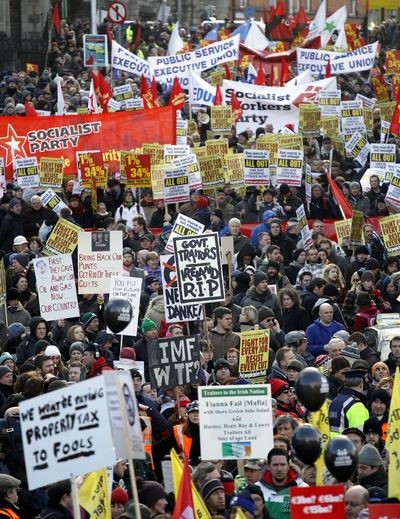Protesters in Ireland decry painful cutbacks

LONDON – Ireland is on the verge of reaching a preliminary agreement with international finance officials on a massive bailout package, a government minister said Saturday, as thousands of angry demonstrators marched through Dublin to protest the country’s latest round of painful public-spending cutbacks.
Irish Communications Minister Eamon Ryan told broadcaster RTE that his colleagues and their counterparts with the International Monetary Fund and the European Union were working hard to produce an “outline agreement” in time for the opening of financial markets Monday.
Dublin is deep in the hole because of its devastated banking sector, whose losses have pushed the government’s budget deficit to a staggering 32 percent of gross domestic product.
In addition to jittery international markets, Dublin also must contend with an increasingly angry populace, including many who blame the government’s coziness with the banks for bringing Ireland to its knees and who reject the tough austerity measures it has introduced to rein in the deficit.
Under the latest austerity plan, unveiled last week by Prime Minister Brian Cowen’s government, thousands of public sector jobs will be eliminated, property and sales taxes will increase, welfare benefits and pensions will be cut, and the minimum wage will decrease.
The announcement of even a draft agreement today would represent a speedy outcome to negotiations that had been expected to take weeks.
In the last few days, however, concern about Ireland’s precarious finances began spreading to other troubled nations that use the euro, particularly Spain and Portugal, whose borrowing costs also have hit almost unsustainable highs.